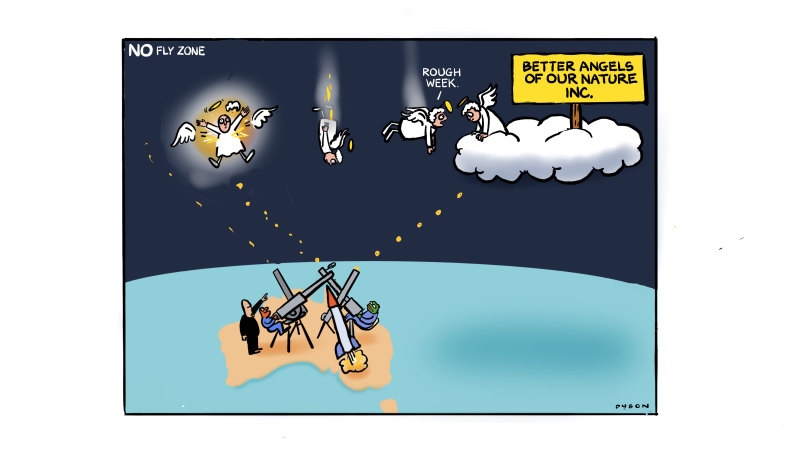Save articles for later
Add articles to your saved list and come back to them any time.
Andrew DysonCredit: .
To submit a letter to The Age, email [email protected]. Please include your home address and telephone number. No attachments, please include your letter in the body of the email. See here for our rules and tips on getting your letter published.
How can Jacinta Price say that colonisation has been good for Australia’s Indigenous people? Alcohol has destroyed communities, song lines and sacred sites have been mined, developed or detonated, children have been stolen from their families. Suicide and deaths in custody are tragically commonplace. Colonisation has only ever benefited the colonists. Jane Laver, St Kilda
They’ve never had it so good eh?
Invasion, frontier violence, massacres and disposition, loss of land, degradation of culture, destruction of sacred sites, and so much more. Yes, Indigenous Australians have never had it so good.
Colin Smith, Mount Waverley
All power is with the conquerors
Colonisation achieved wealth and power through enforced slavery and appropriation of land, resources and culture. It is about conquering nations, killing natives, subjugation, and empire building. For Jacinta Price to state that colonisation benefited Indigenous people is outrageous. Colonisation did the opposite.
Before colonisation, Indigenous people were not incarcerated, they were not suffering from Western diseases, addicted to alcohol and drugs, being murdered, enslaved and suffering the trauma of their children being stolen. Colonisation did that. John Lacey, Richmond
Closing the Gap report tells the story
One is incredulous that Jacinta Price can dismiss the impact of colonisation on Aboriginal people. Let us begin with the concept of terra nullius and the theft of land. The introduction of diseases and alcohol. The massacres. The stolen generation. The destruction of sacred sites. The incarceration in prisons. Today, this can all be summed up in the failure of Closing the Gap report, which illustrates the continuing great disadvantage experienced by many Aboriginal people. Nowhere has colonisation been good for any Indigenous people; we still must confront it.
Judith Morrison, Nunawading
If this is good, what is bad?
Giving Indigenous groups poisoned flour, smallpox-infected blankets, settlers going on shooting parties, stealing land and their children is “good”? It terrifies me to think what “bad” would look like. George Djoneff, Mitcham
The Voice will give agency
Jacinta Price’s statement that colonisation did not and does not have any negative effects, such as intergenerational trauma, on First Nations’ peoples has inadvertently supported the principles of the Voice. She also said that “the worst possible thing you can do to any human being – to tell them they are a victim without agency″. This is what the Voice is all about. No more, no less. To give First Nations’ people agency, responsibility to represent themselves to the government of the day. David Conolly, Brighton
FORUM
Rethinking footy support
The failure of the AFL in the Angus Brayshaw case will have all parents and grandparents, such as myself, seriously reconsidering their support for their children and grandchildren playing AFL football at junior levels. Why would I support my granddaughter taking up this sport knowing that the league refuses to protect the head of the player going for and or in possession of the ball?
The league will come to regret this mistake. It should as an organisation be ashamed of its unwillingness to sanction the hit on Brayshaw. The AFL needs to get its act together or it will see support for this game evaporate. Dr Greg Gardiner, Brunswick
Mandatory helmets
Cricket authorities have made the wearing of helmets compulsory for batters, wicketkeepers and close-in fielders. Helmets do not impede a player’s ability to play freely and are now universally accepted everywhere. The authorities could have simply banned short-pitched bowling, as many people called for, but they didn’t because they recognised that bouncers, although potentially dangerous, are an integral part of the game.
In the past some footballers have worn lightweight helmets but they have not been adopted by the majority of players, probably because they have not been forced to by the AFL. Rather than banning high marking, also an integral part of AFL/AFLW football, perhaps the AFL should consider making helmets mandatory for all players.
Greg Hardy, Upper Ferntree Gully
Take rugby’s lead
An analysis of the big hits from the recent 2023 Rugby World Cup games shows that Brayden Maynard’s smother attempt would and should have been a red card send-off. Feet leave the ground in an uncontrolled manner, impact on the head, careless, avoidable and dangerous. AFL needs to take the lead from the real ″hard game″ and stamp out any head-high tackle. Rugby has form and integrity in contact sports when dealing with dangerous play.
John Harris, Williamstown
AFL, set new standards
As a former anaesthetist who has seen the devastating impact of head injuries on the victims, and on their families, I was sickened by the AFL tribunal’s decision to exonerate Brayden Maynard of reckless conduct in his collision with Angus Brayshaw.
In reaching its decision, the tribunal was asked to focus on factors such as whether Maynard was looking at the ball, whether there was ″malicious intent″, whether he could have taken action in a split second to avoid the collision, or whether Brayshaw might have inadvertently strayed into his path and caused the collision. In the process, the longer term consequences of such impacts took second place to short-term concerns about an individual player having to miss out on playing in a grand final. What would it have mattered if the ball had not been smothered, one to six points at most? How does that compare with a major head injury?
If the AFL is serious about reducing the life-destroying impact of major head injuries on the players who have made the game as rich as it now is, it needs to switch to different, outcome-based standards. If one player hurtles head on into another, and it results in a major head injury, the penalty should be fixed and not subject to the vagaries of a tribunal that is applying the AFL’s laws of the game.
Mike Sanderson, Drouin
How to become fairer?
It seems that involvement in our political system pushes participants towards a skewed set of values, lacking in empathy and compassion. It’s a ″whatever-it-takes″ world of winners and losers.
It’s also true that it’s not just in politics. The business world is replete with ″dog-eat-dog″ attitudes, reflecting less savoury, but common aspects of our culture. When policies are presented, the general response is not what’s best for all of us, but what’s best for me.
And so, everybody fights for their piece of the pie, without regard for the general wellbeing. Even those who represent concern for those less well-off are tarred with the same brush. It’s not just politics and business. Selfishness exists in all our daily lives. Perhaps our political system merely reflects the values in our society.
The question is, how can we create a fairer society, one which promotes kindness, compassion and generosity?
John Hannah, Castlemaine
Value the worker
Employers are concerned that new IR laws will lead to more strikes. That would hardly be the outcome if employers paid their employees an adequate wage and had decent working conditions in the first place. Perhaps employers should ″value″ their workers a bit more.
Greg Tuck, Warragul
It’s shopping, doggone it
″Take your dog with you to the park″ (Letters, 15/9) is good advice. It’s hard to say though which is more important to the average dog – the ″with you″ companionship or the park location. As pack animals, dogs want to be with the pack leader. That’s you, including when you’re at the shops. In my experience, dogs love to go shopping and everywhere else with their ″owners″.
Lawrie Bradly, Surrey Hills
Cry freedom, for pooches
Now that daylight savings is creeping up on us again, here is my annual whinge. Miles and miles of beaches down here and for six months our dogs will be banned from those beaches except between 7pm and 9am. We have no problem with a ban between Christmas and back-to-school times in February but why deprive our pooches, and therefore us, the freedom of our beaches.
Paul Speelman, Blairgowrie
Reduce migration
Australia’s population grew by 563,000 people in the past 12 months. This is greater than the population of Canberra. In this period, Australia has not built a Canberra’s equivalent of schools, houses, hospitals, roads, public transportation and other critical infrastructure.
Amid widespread reports of ambulance ramping, housing shortages and traffic gridlock, the government must reduce migration to allow infrastructure to catch up. As an added bonus, lower population growth would help Australia reduce greenhouse gas emissions and achieve net zero targets.
Justin Chan, Lower Templestowe
Housing stress
Australia does not have enough houses for its existing population. So how can the government allow 2000 migrants a day into the country? What sort of stress is this going to cause on the housing stock?
Laurens Meyer,
Richmond
The trouble with normal
When phoning companies, there is always a message: ″We are experiencing an unusually high volume of calls and the waiting time will be longer than normal.″ When this happens all the time it means the volume of calls is, in fact, normal, not unusual, and the waiting time will be what it always is.
Geoff Lipton, Caulfield North
Leafy suburbs inertia
Your correspondent (Letters, 8/9) shares not only the same suburb but the same demoralised sentiment about the referendum leadership. However, where we differ is where the inertia lies in the Yes campaign. To me, it lies with the apathy, lack of engagement and inertia of the voters in suburban Melbourne including the leafy educated suburbs. I have cut a lonely figure for the past six weeks dressed daily in Yes vote attire in shopping areas. No interest shown in engagement on the referendum. I would probably obtain more response if I wore my Magpie supporter gear. It feels to me the community is anaesthetised when it comes to the most important moral question of our time. And we are sleepwalking into ignominy.
Diana Yallop, Surrey Hills
A reason for unions
In the future, should anyone ask, why do we need unions? the answer shall be ″Qantas″.
Peter Russell Meulan, Delacombe
AND ANOTHER THING
The Voice
Colonialism has been good for Indigenous Australians, says Jacinta Price. I wonder what the Tasmanian Aborigines would say to that?
David Champion, Ivanhoe
I am looking forward to Senator Price being appointed minister for colonial affairs in the next Coalition government.
Daniel Cole, St Albans
If the Voice referendum fails I will be reminded of the words of Xavier Herbert, ″Poor fella, my country″.
Robin Jensen, Castlemaine
The legacies of colonialism are two-fold: intergenerational trauma for descendants of the colonised, intergenerational benefit for descendants of the colonisers.
Trichur Vidyasagar, Doncaster
White man bringing into the country foreign diseases, land appropriated, children stolen – I guess we all view history through different lenses.
Gary Bryfman, Brighton
Disease, dispossession, incarceration, massacres, stolen children, deaths in custody and failure to close the gap are just some of the benefits the Indigenous communities have received from colonialism.
Phil Alexander, Eltham
I wonder if David Littleproud and Bridget McKenzie will be so happy when Jacinta Price becomes the next leader of the Nationals?
Andrew Dods, Apollo Bay
Furthermore
If you are like me and receive weekly supermarket catalogues of specials with the half price ones taking a prominent position at the front you will notice that many of these half price specials are what the everyday price was 12 months ago.
Corrado Tavella, Rosslyn Park, SA
In the 1955 grand final Bluey Adams of Melbourne ran off the exchange bench and charged into Des Healy of Collingwood and knocked them both out. They were both carried off. No reports or charges were laid.
Charles Naughton, Sunbury
Most Viewed in Politics
From our partners
Source: Read Full Article


